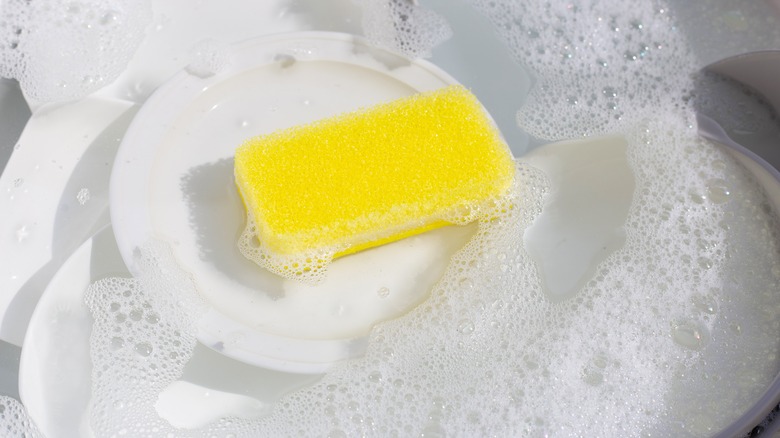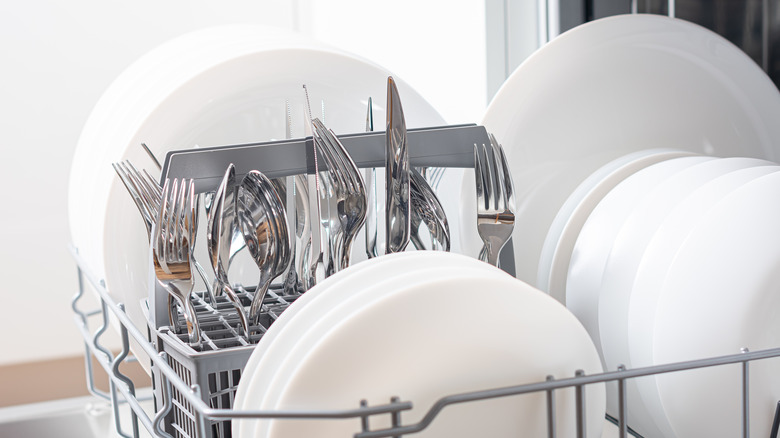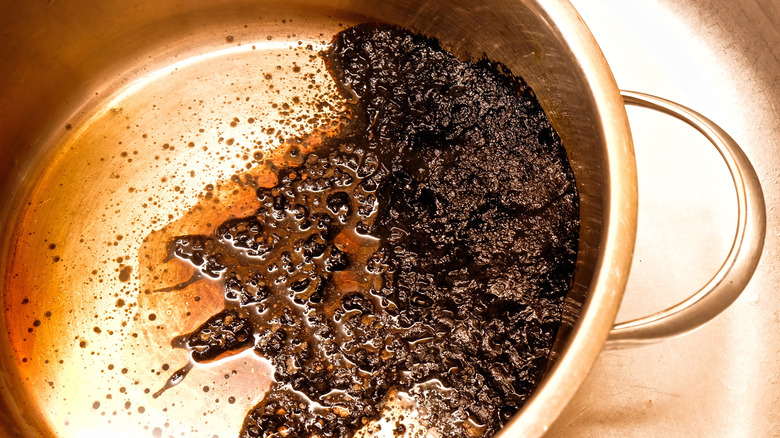Why You Don't Always Need To Soak Your Dishes Before Using The Dishwasher
Everyone has advice on how to best deal with challenging household chores, like washing the dishes. These cleaning tips usually involve a helpful relative or a story (tale) once spotted online, like how Coca-Cola is an effective all-around cleanser. Or that hairspray does more than keep your hair in place — it can sort ink stains, too. Then there's the one about heavy vacuuming and how that can kill your carpet. Or that hot water is a germ-killer. Yet another common one for the (cleaning) books is that soaking or pre-rinsing dishes, cutlery, and cookware is a must before they're loaded into the dishwasher — but is this true?
Per HomeServe, there's a reason why people used to believe this step was a necessary one: They thought their dishwashers weren't equipped to handle heavy food stains, which meant the only way to ensure dishes were cleared of stuck-on food was to give them a good soaking, either in diluted dishwashing liquid or baking soda. Others may have also felt their dishwashers weren't up to the task, because they've spotted food debris on what should've been clean dishes (more on this later).
With this said, the dishwasher step to soak your dishes first is no longer a must — at least, for most scenarios.
Why soaking dishes isn't always necessary
As Consumer Reports points out, soaking may not actually be doing your dirty dishes any favors, and that's thanks to the way dishwashers have been designed and built since 2011. More advanced dishwashers today actually come built in with sensors that can detect how dirty your plates are; and if the sensor doesn't think the plate is dirty, then its pre-wash won't give dirty dishes the attention it needs and you're likely to see bits of food stuck to your dishes at the end of the cycle. Given this, there's also the idea, then, that a pre-soak (or a pre-rinse) simply wastes plenty of water; a pre-soak can use up to 6 gallons of water.
Cleaning experts have also offered up a safety-related reason why soaking your dishes shouldn't be an option. Liquid soap maker Yaya Maria's warns that our sinks naturally are a breeding ground for different types of germs anyway — from bacteria, which come from the raw ingredients we cook like meat and seafood, to the germs that reside organically in our plumbing. Soaking dirty dishes, crockery, or cutlery in this environment will neither do your dishes, nor your sink, any favors.
There are exceptions to the rule
But there are times when a good soak may be worth it, and those are the times when we accidentally burn food, which causes it to stick to the bottom and sides of a pan. But even then, as The Washington Post points out, soaking doesn't work all the time then either. While water can work wonders with carby or sugary residue, it doesn't do very well with oils and fats, and even a soak will leave you with a slimy layer of oil on an obviously still-dirty dish.
When you're dealing with dishes with fat or burned-on food, using soap or baking soda along with hot water will do wonders to help you sort out stubborn food stains. But no matter what the stains look like, experts like the University of Maine's Jason Bolton say some materials should not be soaked because spending extra time in the water will end up damaging your utensils and cookware. This rule applies to utensils and dishes made of wood and cheaper plastic, as well as cast iron — which can rust if it spends too much time in the water.
As a pro tip, if you're getting scummy dishes after a turn in a new dishwasher, you might want to check out the machine's drain filter and make sure it's clean.


